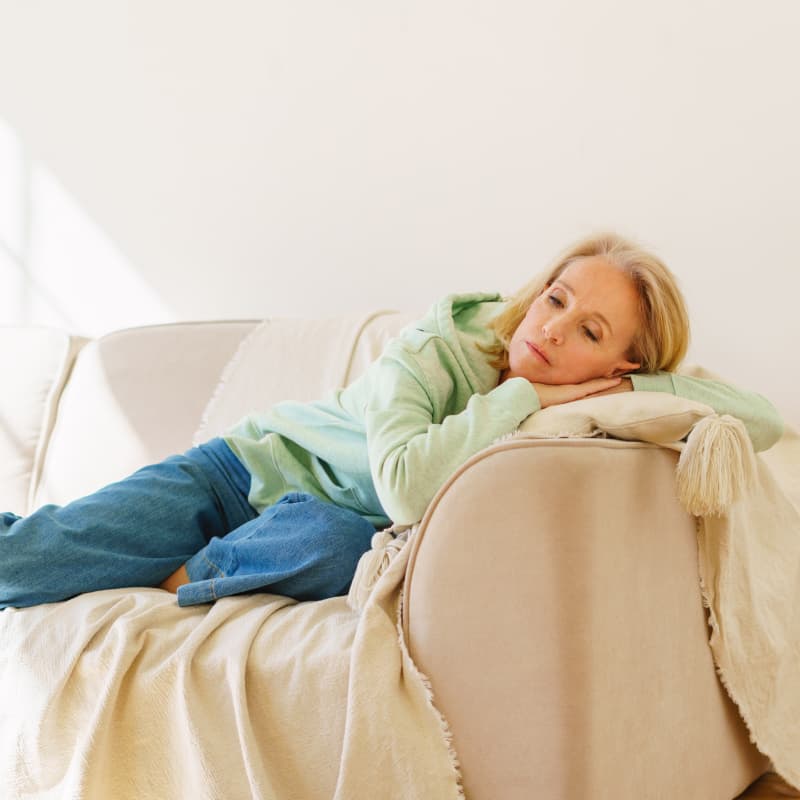
Why is sweating so important?
Sweating plays a vital role in the human body’s temperature regulation system, but what is the cause of night sweats during menopause?
Sweating is always to be expected when working out or in a sauna. Waking up due to excessive sweating without any physical activity, on the other hand, is a different story.
Sweating more than what the body requires to regulate body temperature is referred to as night sweats.
Menopause or other underlying health conditions could be the causes of excessive sweating during sleep. Night sweats can disrupt sleep, make you and your partner uncomfortable, and cause major discomfort and dehydration. So, let’s learn more about the reasons for night sweats during menopause and find a solution to this issue.
What is Menopause?
Menopause occurs anywhere around the age of 40-58, and it refers to a phase in a women’s life when she no longer has her period. Significant changes in the body’s production of the hormones oestrogen and progesterone are thought to be a major cause of hot flushes and the cause of night sweats during this time. [1]
Can Menopause be the cause of night sweats?
Did you know that around 85% of women experience hot flushes during the stage of menopause, making hot flushes and night sweats one of the most common symptoms of menopause? Some women with menopause battle with these issues for several years as night sweats usually start during the perimenopause period and can last until a woman is postmenopausal.
Menopausal hot flushes last a few minutes and can happen several times during the day and night, causing night sweats. Many women (up to 64%) experience sleeping issues and greater rates of insomnia throughout perimenopause and menopause. [1]

How can I prevent night sweats during Menopause?
If you are experiencing sleepless nights due to night sweats caused by menopause, the following measures may help you solve this issue:
- Wear light and breathable clothing at night.
- Keep your bedroom cool at night with the help of a fan or air conditioning.
- Take a cool shower before sleeping.
- Try to de-stress (Studies have also shown that strategies like regulated breathing can assist menopausal women in reducing hot flashes and night sweats).
- Avoid spicy food, coffee, smoking, and alcohol as they are all potential triggers.
- Exercise regularly and reduce weight if you are overweight.
- Drinking cold water before bedtime: Some women with night sweats find that drinking some cool water before bedtime helps them achieve a more comfortable body temperature.
For women with severe symptoms, doctors may recommend Hormone Replacement Therapy (HRT). After menopause, hormone replacement treatment (HRT) such as Evorel Patch is used to reduce symptoms.
However, some medications might have unpleasant side effects, making it important to talk to a doctor about the risks and benefits before starting therapy. [2]

Is there any treatment to prevent the cause of night sweats?
Some women can tolerate night sweats without treatment. However, if it becomes highly unpleasant, the doctor may recommend Hormone Replacement Therapy. Many women experience fewer hot flushes as a result of this.
It can also assist with other menopausal symptoms, including vaginal dryness and mood swings. However, once you stop using HRT, your symptoms like night sweats may reappear.
Blood clots, breast and endometrial malignancies, and gallbladder inflammation are among the risks associated with short-term HRT. Thus, before starting any treatment, it is crucial to discuss your medical history and the risks associated with the treatment with your doctor. [2]
Where can I order HRT treatment for menopause?
e-Surgery online prescription service and pharmacy provide the following treatments to help with menopause symptoms including night sweats.
It is critical to inform your doctor or pharmacist about your medical history and any medications you are presently taking before purchasing any medications listed above and beginning treatment. When starting a new medicine, always seek the advice of your healthcare provider.
What relieves night sweats for one woman may not work for another. Menopausal symptoms can be relieved with home remedies, and in severe situations, medications such as hormone therapy can be used.
If you’re experimenting with different treatments and lifestyle modifications, keeping a sleep journal can help you figure out what works best for you.
Sources
- Night Sweats: Causes and Treatments (Sleep Foundation)
- Menopause – Treatment (NHS)
Further Reading
- Hot flushes (NHS UK)
- 8 Causes of Night Sweats (WebMed)
- Menopause Treatment (NHS UK)









